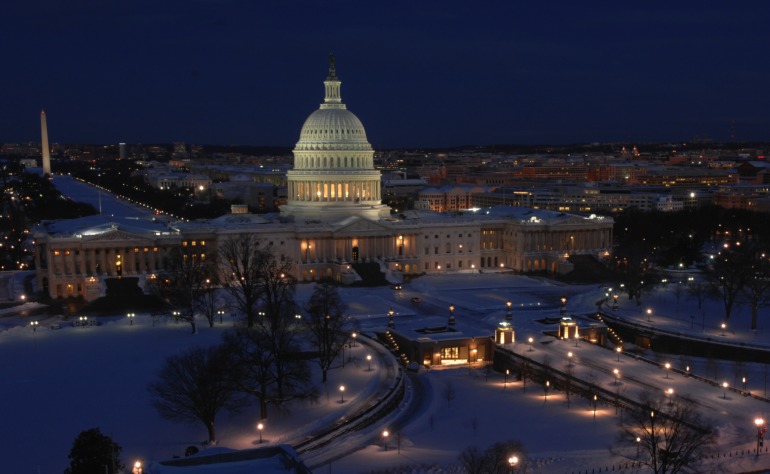Newsletter
Feb 25, 2022
Policy Matters Newsletter - February 25, 2022
Senate Passes The “Ending Forced Arbitration of Sexual Assault and Sexual Harassment Act of 2021”; Biden Signature Imminent. As Seyfarth noted in this legal update, the central thrust of the measure is to permit persons alleging sexual assault or harassment to do so in court, even if the aggrieved person signed a predispute agreement to arbitrate all claims. H.R. 4445 applies not just to individual arbitration agreements, but also to class or collective action waivers that purport to prohibit or waive the right of employees to participate in joint, class, or collective actions alleging issues which relate to sexual harassment or sexual assault. Finally, the measure provides that it is the purview of the court to determine the arbitrability of a given claim, regardless of whether contractual language governing the dispute delegates that decision to an arbitrator. The bill does permit some flexibility, though, if the aggrieved person prefers to pursue arbitration, he or she may do so.
The Reopening (Again). Most states and municipalities have recently lifted or announced that they will be lifting masking requirements and vaccine mandates. The District of Columbia recently announced that it had rescinded its vaccine mandate for indoor venues effective February 15th, and its indoor mask requirement will expire on February 28th. As Seyfarth has reported, New York lifted its mask-or-vaccinate mandate for nearly all public places of business effective February 10, 2022, and the New York Department of Labor has revised its model safety plan under the HERO Act to eliminate the mask requirement in most settings. California has also lifted its indoor mask mandate for vaccinated individuals effective February 16th, and it plans to evaluate whether to lift the mask requirement in schools on February 28th. And on February 17th, New Mexico Governor Michelle Lujan Grisham announced that the state would be lifting its indoor mask mandate, effective immediately. Seyfarth recently dropped a podcast exploring the liability shields established toward the beginning of the pandemic, addressing shields that have expired or are set to expire, and whether they should be altered or extended in light of the reopening. Check it out.
New Tranche of CA COVID-19 Sick Leave Is Now In Effect In California. At the onset of the pandemic, California was one of the first states to require paid sick leave for COVID-19-related reasons intended specifically to fill the sick leaves gaps left by the FFRCA. The California Legislature renewed the measure for 2021, which expired last September. Most believed that we were in a good enough place, pandemically speaking, that another tranche of sick leave would not be necessary. While there were rumblings of a vaccine-mandate measure that did not come to fruition, it appears that this new tranche of COVID-19 SPSL is a compromise in lieu of vaccine mandates for most private employers.
The newest allotment, in comparison with previous versions, provides employers a little more breathing room by curtailing the potential length of, and the documentation required for, paid sick leave. Under the third iteration of COVID-19 mandatory paid sick leave, two banks of leave will be available: one bank of up to 40 hours will be available if an employee or a family member tests positive for COVID-19; employees can access a separate bank of sick leave of up to 40 hours for all other covered reasons. These other covered reasons largely track the 2021 CA-SPSL, with a few expansions for caring for family members.
Employees may only take up to 24 hours of paid leave per vaccine/booster injection unless the employee provides verification from a health care provider that the covered individual is continuing to experience symptoms related to the vaccine or booster. In addition, if an employee tests positive, the employer may require the employee to submit to a diagnostic test on or after the fifth day and require documentation of results. This iteration also alters the wage statement requirement -- instead of providing the available balance on wage statements (or written notices issued on pay day), employers now only need to list the amount of leave that has been used. If an employee has not yet used any leave, their statement must list “zero.”
If you have question about the nuances of this technical bill, please reach out to your favorite Seyfarth counselor.
Biden Executive Order is a Boon to Unions On Federal Construction Projects. On February 4th, President Biden signed an executive order requiring project labor agreements (PLAs) in federal construction projects over $35 million. Project labor agreements are collective bargaining agreements between building trade unions and contractors, which set wages, employment conditions, and dispute resolution on specific projects. The executive order notably does not require construction companies to unionize, but it does bind contractors’ employees to the terms of a PLA, which must contain guarantees against strikes, lockouts, and similar job disruptions, binding procedures for resolving labor disputes and mechanisms for labor-management cooperation. President Biden’s executive order will impact nearly 200,000 workers and apply to $262 billion in federal construction contracting, and the Biden Administration says it will speed up building times. This further builds on President Biden’s campaign promise to be the most union-friendly president in American history.
PAGA -- A Perpetual Thorn In The Side Of Management -- Will Get A Real Test Before SCOTUS, And California Voters. Speaking of arbitration, in a significant turn of events for employers, on December 15, 2021, the U.S. Supreme Court granted a petition for certiorari filed in Viking River Cruises, Inc. v. Moriana, No. 20-1573 (Dec. 15, 2021), to review whether courts can exclude claims brought under the PAGA from federal arbitration requirements, paving the way for a potentially transformative ruling. The Supreme Court’s ruling could dictate the future of the PAGA as a workaround to workplace arbitration, especially as states outside California have considered, but ultimately failed to pass, similar legislation. We will be following this case as it proceeds through briefing, oral argument, and the ultimate holding. Stay tuned.
As Seyfarth summarized in this blog -- we encourage the read for a good primer on PAGA’s enforcement mechanism -- California employers appear to have tired of arguing unsuccessfully in California Courts that PAGA is an unconstitutional enforcement scheme. So, the issue, as is often the case in California, now rests in the hands of California voters: Proponents of The California Fair Pay and Accountability Act -- which aims to replace PAGA with alternative Labor Code enforcement mechanisms that would provide 100% of the proceeds to the worker bringing the claim -- have gathered at least 25% of the signatures required to qualify for the November Ballot. The ballot measure is sponsored by a number of significant trade associations. We will be following the campaign closely and will provide any relevant updates as this measure journeys to the ballot. Stay tuned.
More Non-Compete Legislation Likely Coming To A State Near You. In a relatively new development, many red states are considering new non-compete legislation in the face of today’s increasingly tight labor market. Although laws restricting the use and requirement of non-competition clauses have typically been the domain of democratic-majority statehouses, including 10 states that have banned employers from requiring low-wage or hourly employees to sign non-competes, republican-led legislatures, including Iowa and West Virginia, are now seriously considering similar legislation. There are also signs of bipartisan support in Congress for restricting the use of non-competes, but to date there is not enough support to pass a federal law. This newsletter previously reported on its suspicion that Federal Trade Commission Chair Lina Khan might seek to support legislation or engage in agency rulemaking to restrict the use of employee non-competes. This push to ban non-competes is similar to the push that resulted in HR 4445, banning pre-dispute arbitration clauses. Stay tuned.
Marijuana Laws Sprout Throughout The Nation. 2021 saw the proliferation of marijuana laws at an unprecedented level. Connecticut, New Jersey, New Mexico, New York, Philadelphia, and Virginia all enacted laws relaxing restrictions on marijuana, as reported by Seyfarth. Many other states are considering enacting new or amending existing laws to provide employment protections to marijuana users, so there will almost certainly be more to come in 2022. With support for marijuana growing like a weed, employers with drug testing requirements may want to revisit their policies on marijuana, especially if they find it difficult to recruit and hire talented workers or they do not employ safety-sensitive or other regulated positions. Employers with drug and alcohol testing programs should consider a fresh review of their policies to decide whether they will continue to test for marijuana. Lastly, drawing on state disability discrimination laws, medical marijuana users are filing lawsuits against employers for failure to accommodate and for disability discrimination, which appear to be gaining traction. Thus, employers should consider having in place a clear policy and procedure for addressing accommodation requests from applicants and employees using cannabis. Seyfarth recently held a webinar on these topics, which can be viewed here. Contact your favorite Seyfarth counselor for a closer look at your current drug testing protocols.
Legislative Intrigue: CA Vaccine Mandate Bill Introduced. Passage of a third tranche of SPSL has not impeded California legislators from introducing additional COVID-19 mitigation measures. Indeed, California Assemblmember Buffy Wicks introduced AB 1993, which would require employers to ensure that every employee and independent contractor is vaccinated against COVID-19. This would be a hard mandate with no weekly testing alternative to getting vaccinated. The bill does not provide for a private right of action but would permit the Department of Fair Employment and Housing to levy fines for failure to comply. This measure has a long -- and perhaps unlikely even in the golden state -- road ahead to enactment, but we will continue to monitor developments. Stay tuned.
Employers Beware: DOJ Is On The Lookout For, Is Prepared To Punish, Price Fixing. As Seyfarth noted here, the US Department of Justice’s (DOJ) Antitrust Division has announced a new enforcement initiative to find and stop price fixing agreements seeking to hide behind supply chain disruptions allegedly caused by the pandemic. The DOJ will be looking at significant price increases for goods to determine whether the sudden rise in price is attributable to legitimate economic forces, or whether inflation is being used as a cover for a horizontal price fixing scheme among competitors. In an enforcement environment where government officials may be searching for scapegoats to blame for the recent inflationary spiral, companies should ensure that they have a solid antitrust compliance program in place and that decisions about the prices they charge are made unilaterally.


